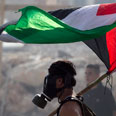
Mideast peace a pipedream?
Op-ed: Radical Muslim minority powerful enough to ensure peace never takes root
A dubious conference that was scantly reported in the Western media took place in Iran this week, one that should serve as an unambiguous warning sign for proponents of the two-state solution and the prospects for establishing a lasting peace in the region.
The 5th International Conference for Defending the Palestinian Intifada wrapped up this past Sunday, and, like Tehran’s previous Holocaust conferences, boasted a relatively impressive number of high-ranking politicians and scholars from nations around the world. The motto for this year’s conference? “Palestine, home of the Palestinians.”
Hamas Politburo Chief Khaled Mashaal made clear that the two-state solution is invalid. “Palestinians must resort to resistance no matter how costly it is, until Palestine is free and Israel is destroyed.”
Islamic Jihad Secretary General Ramadan Abdullah Mohammad Shallah stated, “We regard the Zionist regime as an occupier which has no legitimacy and is declining in importance.” Iranian President Mahmoud Ahmadinejad declared that "effort must be made to free every span of the lands of this country from the Quds occupying regime (Israel)," calling for the “Zionist occupiers of Palestine” to return to their lands of origin.
Although several disturbing mantras emerged at the conference, the statements above reflect a more threatening, overarching reality: A powerful, belligerent conglomeration of forces continues to object to Israel’s presence, no matter the arrangement the country holds with its neighbors. It would be wise to consider what potential effects these forces could have on the region’s long-term future, and on Israel’s political and security situation.
Proponents of the two-state solution need to understand the serious barrier this minority poses to finding an equitable solution to the Israeli-Palestinian conflict. Perhaps these elements are a “minority” on the world stage, but that minority is sizable and powerful enough to ensure that a fair and peaceful solution is never achieved.
Iran has declared publicly on several occasions that, even if a comprehensive peace agreement were to be reached between Israel and the Palestinians, the country would never recognize Israel. Iran’s’ supreme leader, Ayatollah Khamenei, dismissed Abbas’ statehood bid as it would recognize the “cancerous tumor” as a legitimate entity. He completely dismissed the two-state solution as an acceptable option, even if the Palestinians themselves support the initiative and reach a compromise with Israel.
Likelihood of peace slim
Recognition of and normalization of relations with Israel was a critical point of attraction ostensibly offered by many Arab states in the 2002 Saudi-sponsored Arab Peace initiative, Unfortunately, the plan received meager or no support from the nations and government entities that pose the biggest military threats to Israel in the region.
Powerful elements and leading figures in Hamas, Hezbollah, Syria and Iran, the four entities considered to be the most hostile towards the existence of the Jewish State, have often and repeatedly expressed the position that, regardless of a future compromise between Israelis and Palestinians, their hostile demeanor won’t dissipate. Each of these entities will continue to use “resistance” until the “Zionist entity is eradicated.”
If we look at recent polls, such as the 2011 Democracy Index, we see strong indicators that Israeli-Arab peace seems to be a real possibility. For example, the majority of Palestinians have signaled that they accept a two-state solution. However encouraging that may be, Israel and the international community would be foolish not to take into consideration the extremely hostile minority that will continue to oppose Israel’s existence based on religious and political ideology.
Unfortunately, even if an agreement were reached now in the best of intentions of all parties involved, the likelihood of achieving a true, lasting peace is still very slim, simply because the "minority" that opposes the peace process and recognition of Israel happens to comprise a group of well-financed, well-armed, politically capable elements and nations whose formidable ideology and influence aren’t susceptible to sanctions, international isolation, or the democratic process.
Furthermore, as Egypt and Jordan have seen an increase in anti-Israel sentiment in the wake of the Arab Spring, calls for democratic reforms will most likely provide a platform for Islamic organizations to ascend to power, complicating regional relations with Israel and destabilizing the region even further.
The above realization needs to be emphasized in the strongest possible terms in all political circles and public relations efforts, especially to entities that seek to impose their own will on our region and force our hand in the Arab-Israeli conflict.
While peace may be established with the majority of our Arab neighbors, radical elements such as those gathered at the Tehran conference will continue to rise up against Israel through violence.
Avi Yesawich is an independent journalist and political commentator on Middle East affairs. He holds degrees from Cornell University and Tel Aviv University, is an IDF combat reservist and co-founder of www.israelicentrism.com
- Follow Ynetnews on Facebook
- Receive Ynetnews updates directly to your desktop










